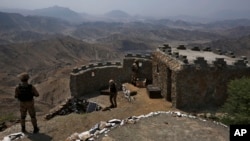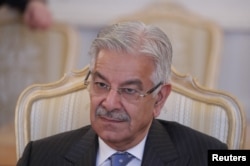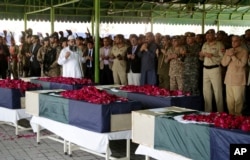Pakistani Defense Minister Khawaja Asif says a new wave of terrorist attacks in his country is originating in Afghanistan and he has urged that nation's Taliban rulers to stop it in line with their counterterrorism pledges.
Asif's assertions come as a spate of terrorist attacks in Pakistan has killed hundreds of people, mostly security forces, in recent months. An outlawed alliance of militant groups, the Tehrik-i-Taliban Pakistan (TTP) or the Pakistani Taliban, has claimed responsibility for much of the violence.
"They are coming from across the Afghan side of the border to carry out these activities. They may have sleeper cells here [in Pakistan], but their overwhelming presence is on Afghanistan's soil," Asif told the local Geo news TV channel late Monday.
He spoke after attending an hours-long meeting of the National Security Committee, the country's highest security-related forum comprising political and military leadership, which reviewed the rise in terrorist attacks. It issued a subtle warning to the Afghan Taliban.
"The forum concluded that no country will be allowed to provide sanctuaries and facilitation to terrorists and Pakistan reserves all rights in that respect to safeguard her people," said a post-meeting statement without naming Afghanistan.
Asif recounted that the Taliban pledged in a February 2020 deal signed with the United States in Doha, Qatar, they would not allow the use of Afghan soil for terrorism against any country.
"We have been requesting the Taliban ever since they returned to power to stop the TTP from plotting terrorist activities in Pakistan," Asif noted.
"This is your obligation under the Doha agreement and this is also Kabul's obligation or duty towards our brotherly, neighborly relations," the minister said. "We hope that they will rein in and control this new wave of terrorism against Pakistan, which is stemming from their territory."
A spokesman for the Taliban administration Tuesday responded to Islamabad's assertions, calling them "false" and "regrettable."
Zabihullah Mujahid said in a statement that Afghanistan wants peaceful relations with all its neighbors, including Pakistan, to promote internal as well as regional peace and stability.
"The Islamic Emirate is trying its best to ensure that the territory of Afghanistan is not used against Pakistan or any other country," Mujahid said, using the official title for the Taliban government, which has yet to be recognized by the world.
"We are committed to this goal, but the Pakistani side also has a responsibility to resolve the situation, avoid baseless talks and provocative ideas, because such talks and mistrust are not in the interest of any side," Mujahid said.
The TTP, designated as a global terrorist organization, is a Pakistani offshoot and close ally of the Afghan Taliban.
After its emergence in Pakistan's volatile border regions in 2007, the group sheltered and provided personnel for the Islamist Taliban insurgency against the United States and NATO forces in Afghanistan.
The Taliban reclaimed power in Kabul in August 2021 as the then-Afghan government and its security forces collapsed and all U.S.-led troops withdrew from the country after 20 years of involvement in war.
TTP chief Noor Wali Mehsud and his commanders have long taken shelter in Afghanistan after fleeing counterterrorism military operations in Pakistan. But Pakistani officials maintain the militants have been roaming freely in Kabul and operating with greater freedom out of their Afghan bases since the Taliban takeover.
Mehsud routinely issues media statements through his spokesman, directing TTP cross-border deployments and praising terrorist attacks.
The violence claimed by or blamed on the TTP and other militant groups killed almost 1,000 Pakistanis, including nearly 300 security forces, in some 376 terrorist attacks in 2022.
The Islamabad-based Center for Research and Security Studies, a nongovernmental organization, documented the details in its annual report, noting that most of the attacks have occurred in Khyber Pakhtunkhwa and Baluchistan provinces, both lining Pakistan's nearly 2,600-kilometer border with Afghanistan.
The report said that more than 40 security forces were killed in December alone, making it the deadliest month in a decade of terrorist violence in Pakistan.







